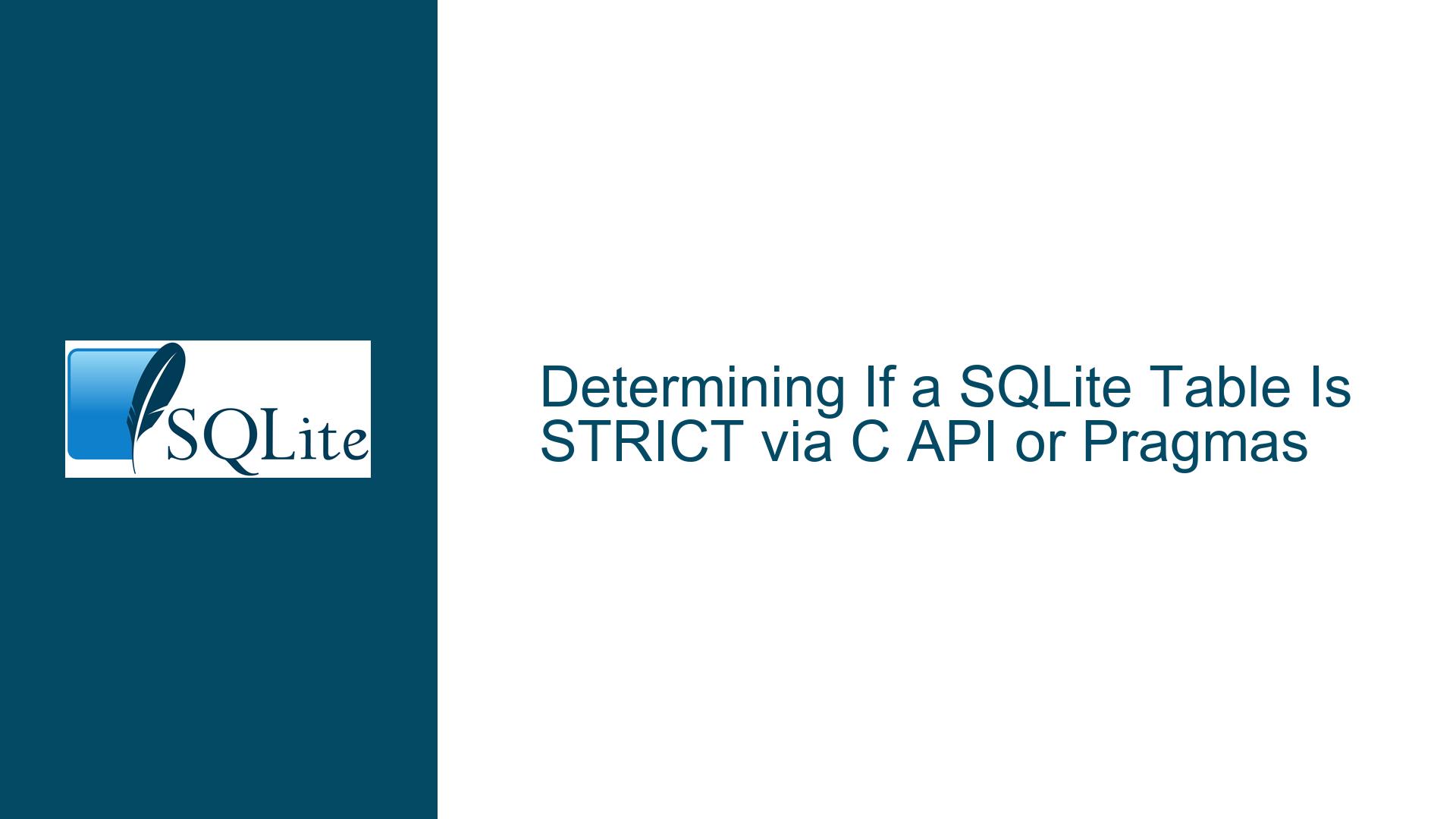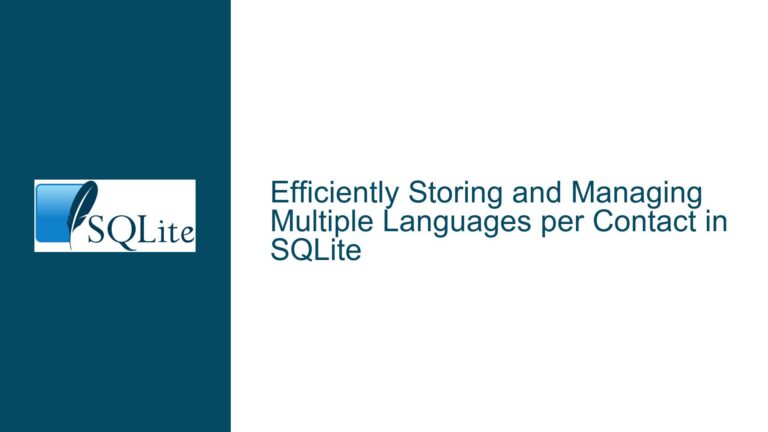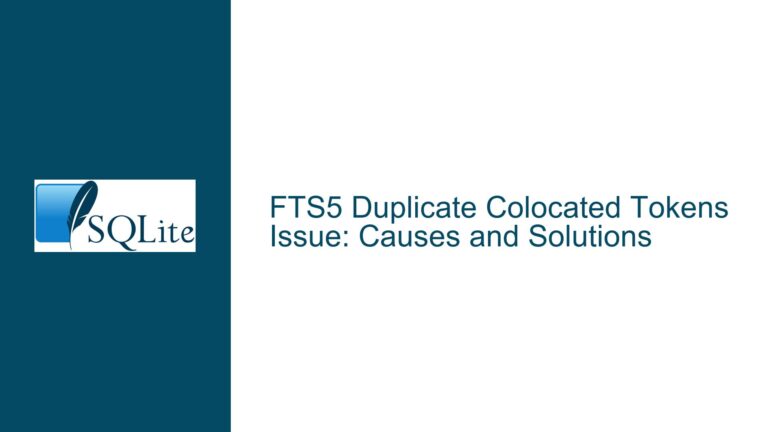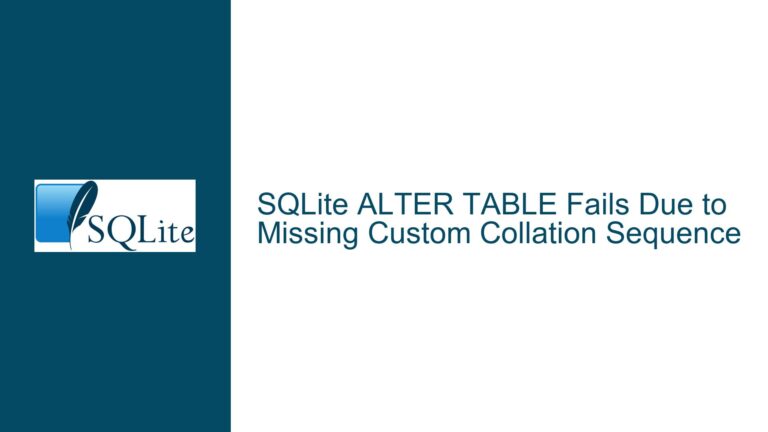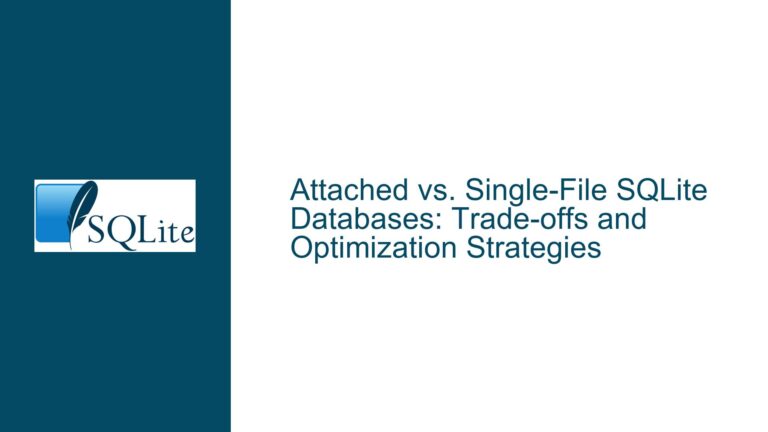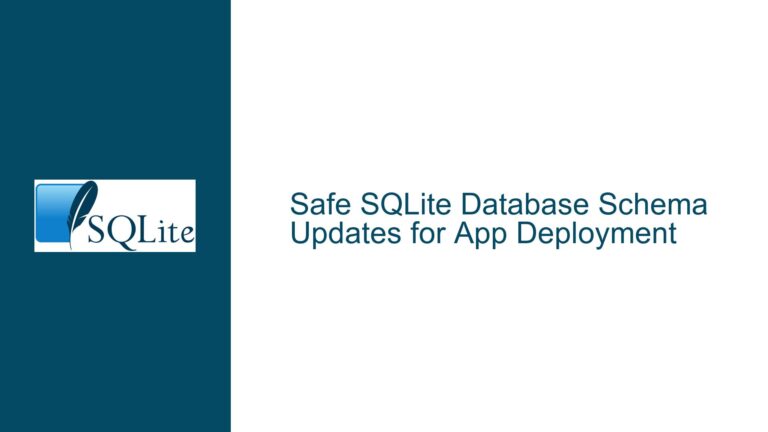Determining If a SQLite Table Is STRICT via C API or Pragmas
Understanding the Need to Identify STRICT Tables in SQLite
SQLite introduced support for STRICT tables in version 3.37.0 (2021-11-27). A STRICT table enforces rigid type checking for columns, ensuring that values inserted or updated in the table adhere strictly to the declared column types (e.g., INTEGER, TEXT, BLOB). This differs from SQLite’s default behavior of using type affinity, which allows flexible type conversions. For applications requiring strict data integrity, verifying whether a table is defined as STRICT is critical. However, SQLite does not provide a direct C API function (e.g., sqlite3_table_column_metadata) to programmatically determine this property. This guide addresses the challenge of identifying STRICT tables using available SQLite interfaces, including pragmas and virtual tables.
Core Challenges in Detecting STRICT Table Status
1. Lack of Direct C API for Table-Level Metadata
SQLite’s C API includes functions like sqlite3_table_column_metadata(), which retrieves metadata about a specific column (e.g., data type, collation, whether it is part of the primary key). However, this function does not expose table-level attributes such as whether the table was created with the STRICT keyword. Developers working with the C API must rely on indirect methods to infer or retrieve this information.
2. Reliance on Schema Parsing or PRAGMA Queries
In the absence of a dedicated C API, developers often resort to querying SQLite’s internal schema tables (e.g., sqlite_master) or using PRAGMA statements. The PRAGMA table_list command, introduced in SQLite 3.37.0, provides metadata about tables, including the strict flag. However, integrating this into a C application requires executing SQL statements and parsing results programmatically.
3. Schema and Query Execution Context
The schema in which a table resides (e.g., main, temp, or an attached database) affects how metadata is retrieved. Developers must ensure that queries targeting PRAGMA table_list or schema tables account for the correct schema name. Misconfigured queries may return incorrect results or fail to locate the table.
Strategies for Retrieving STRICT Table Information
1. Using PRAGMA table_list in SQL Queries
The PRAGMA table_list command returns a result set containing metadata for all tables in the database. For a specific table, filter the results using the name and schema columns. The strict column indicates whether the table is STRICT (1) or not (0).
Example Query:
SELECT strict FROM pragma_table_list() WHERE schema = 'main' AND name = 'mytable';
Execution via C API:
- Prepare the SQL statement using
sqlite3_prepare_v2(). - Bind schema and table name parameters using
sqlite3_bind_text(). - Execute the statement with
sqlite3_step(). - Extract the
strictvalue from the result set.
Code Snippet:
sqlite3_stmt *stmt;
const char *sql = "SELECT strict FROM pragma_table_list() WHERE schema = ? AND name = ?;";
int rc = sqlite3_prepare_v2(db, sql, -1, &stmt, NULL);
if (rc == SQLITE_OK) {
sqlite3_bind_text(stmt, 1, "main", -1, SQLITE_STATIC);
sqlite3_bind_text(stmt, 2, "mytable", -1, SQLITE_STATIC);
if (sqlite3_step(stmt) == SQLITE_ROW) {
int strict = sqlite3_column_int(stmt, 0);
printf("Table is STRICT: %d\n", strict);
}
sqlite3_finalize(stmt);
}
Advantages:
- Directly retrieves the
strictflag without parsingCREATE TABLEstatements. - Works with the C API through parameterized queries.
Limitations:
- Requires SQLite 3.37.0 or newer.
- Requires careful handling of schemas (e.g., attached databases).
2. Parsing the sqlite_master Table
For compatibility with older SQLite versions (pre-3.37.0), developers can query the sqlite_master table to retrieve the CREATE TABLE statement and check for the STRICT keyword.
Example Query:
SELECT sql FROM sqlite_master WHERE type = 'table' AND name = 'mytable';
Execution via C API:
- Execute the query and extract the
sqlcolumn. - Parse the
CREATE TABLEstatement to detect the presence ofSTRICT.
Code Snippet:
sqlite3_stmt *stmt;
const char *sql = "SELECT sql FROM sqlite_master WHERE type = 'table' AND name = ?;";
int rc = sqlite3_prepare_v2(db, sql, -1, &stmt, NULL);
if (rc == SQLITE_OK) {
sqlite3_bind_text(stmt, 1, "mytable", -1, SQLITE_STATIC);
if (sqlite3_step(stmt) == SQLITE_ROW) {
const char *createSql = (const char *)sqlite3_column_text(stmt, 0);
int isStrict = (strstr(createSql, "STRICT") != NULL);
printf("Table is STRICT: %d\n", isStrict);
}
sqlite3_finalize(stmt);
}
Advantages:
- Compatible with SQLite versions before 3.37.0.
- Does not rely on
PRAGMA table_list.
Limitations:
- Fragile if the
CREATE TABLEstatement uses unconventional formatting or comments containing the word "STRICT". - Requires string parsing, which may be error-prone.
3. Version-Specific Feature Detection
To ensure compatibility across SQLite versions, applications should first check whether the PRAGMA table_list interface is available.
Steps:
- Query SQLite’s version using
sqlite3_libversion()orsqlite3_sourceid(). - If the version is 3.37.0 or newer, use
PRAGMA table_list. - For older versions, fall back to parsing
sqlite_master.
Code Snippet:
const char *version = sqlite3_libversion();
int major, minor, patch;
sscanf(version, "%d.%d.%d", &major, &minor, &patch);
int usePragma = (major > 3 || (major == 3 && minor >= 37));
if (usePragma) {
// Use PRAGMA table_list method
} else {
// Parse sqlite_master
}
Advantages:
- Gracefully handles older SQLite installations.
- Avoids runtime errors from unsupported pragmas.
Best Practices and Troubleshooting
Handling Schema Names Correctly
When querying PRAGMA table_list, ensure the schema parameter matches the database containing the table. For example:
main: The primary database.temp: Temporary tables.- Attached databases: Named aliases provided during attachment.
Common Mistake:
Assuming all tables reside in the main schema. Always bind the correct schema name.
Case Sensitivity in Table Names
SQLite treats table names as case-insensitive but preserves case. Ensure queries use the exact case stored in sqlite_master or pragma_table_list. Use the LIKE operator with case-insensitive collation if necessary.
Example:
SELECT strict FROM pragma_table_list() WHERE schema = 'main' AND name LIKE 'mytable' COLLATE NOCASE;
Error Handling in C Code
Robust C code should handle potential errors:
- Nonexistent Tables: Check if
sqlite_step()returnsSQLITE_ROWbefore accessing results. - Invalid Schema Names: Validate schema names to avoid empty results.
- Memory Management: Use
sqlite3_finalize()to avoid memory leaks.
Testing Across SQLite Versions
If your application targets multiple SQLite versions, implement conditional logic to switch between PRAGMA table_list and sqlite_master parsing. Test against SQLite 3.36.0 (lacking table_list) and 3.37.0+.
Conclusion
Determining whether a SQLite table is STRICT requires leveraging pragmas or parsing schema metadata, as no direct C API exists. Use PRAGMA table_list in SQLite 3.37.0+ for reliable results, and fall back to sqlite_master parsing for older versions. Ensure correct schema handling and robust error checking in C applications to maintain data integrity across environments.
